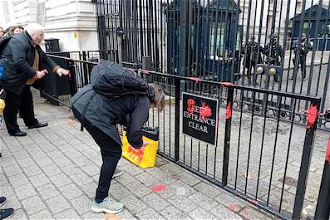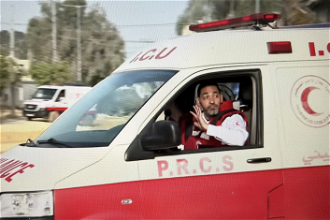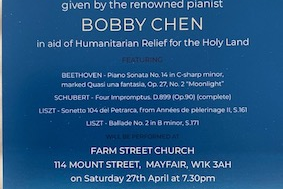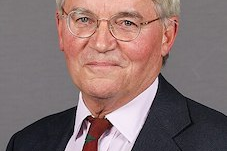Bethlehem eyewitness: Sad to feel happy
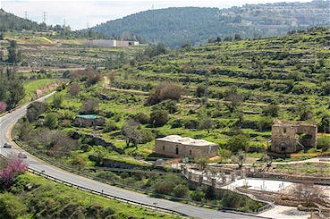
As always, Toine Van Teeffelen Education Advisor at the Arab Education Institute, a Pax Christi Partner in Bethlehem, offers a graphic picture of life under occupation and the creeping land grab of the Israeli Government.
We need some distractions from all the news about the escaped Palestinian prisoners standing up for the right to freedom, says Mary. Palestinian social media was full of it, the prisoners spoke to everyone's imagination.
The distraction is a trip to Ein Haniyyeh, not far from the village of Walajeh west of Bethlehem. It's beautiful late summer weather. 'Ein Haniyyeh includes a spring (' ein = source), canals and two old water reservoirs and other archaeological remnants. Around it is 120 acres of layered terrace land, largely within the borders of the West Bank. The source was previously visited and maintained by the villagers of Walajeh and, decades ago, visited by Christian, Islamic and Jewish pilgrims who often attributed healing powers to the water.
Already years ago we visited the source together with friends. In those days we saw how the Wall separated Walajeh from the source and surrounding terraces. Now we are surprised by another new development. The source and surrounding land have transformed into an Israeli park. The villagers of Walajeh can still reach the source, via a detour, as the park entrance is located on the West Bank side of the checkpoint to Jerusalem. Like others, the villagers now have to pay entrance.
There are a few visitors, mainly Jewish Israelis and a few Palestinians. Some swim in the larger pond or water tank. In comparison to how it was, the location looks pronounced orderly. There are fences, ropes, paths and signs everywhere with explanation or warnings. The terraces have been maintained for many hundreds if not thousands of years by the ancestors of the inhabitants of Walajeh and other nearby villages.
The signs suggest that we are on Israeli heritage, with the names Judea, Nahal Refaim and Mount Gilo prominently mentioned, as well as a quote from Isaiah. The archaeological remains, including those of a Byzantine church, actually largely from the Roman times. According to the surrender, the source was the place where the apostle Philip baptized an Ethiopian traveler, as described in the book Acts. The source and remains of the church are the property of the Armenian Patriarchy. Mary and I breathe in the fresh air and absorb the surroundings in us.
We don't know whether Palestinians of the West Bank will be able to continue to visit the source in the future. The Israeli plan is to move the checkpoint several hundred meters into the West Bank, so that the entrance to the park can only be accessed from the Israeli side, and no longer from Walajeh or any other places on the West Bank. It's about a plan that has been in the pipeline for over a decade. The municipality of Jerusalem has already built the checkpoint infrastructure at its new location, but lingering lawsuits, in which international law does not play any part, slow down the process.
Why this slow down - after all, the Israeli authorities can act quickly if they want to. I have the impression that one is not that unhappy when the more 'controversial' annexation processes take a little longer. Not only to give the transformation the democratic expression of the participation procedures such as a complicated project initiative - but also to let Palestinians and the 'international community' rest in the new facts on the spot over time. A quick takeover would be more like the theft it actually is. In addition, the cared for dealing with local archaeology suggests that Israeli activities serve a civilisation goal and that Israeli presence is deeply rooted here.
A representative of Ir Amin, an Israeli peace organization advocating a Jerusalem shared by Palestinians and Israelis, says: '' The Israeli authorities don't even hide the fact that the location is open to Israeli residents only, while the farmers who are terraces - which forming the pretext of building the park there - being removed from the area." '' The park also creates continuity between Jerusalem and the Etzion block [of Jewish settlements], making al-Walajeh an enclave, isolated and threatened '' (the spokesman
Tarkovsky quoted in Haaretz 16/3/2018).
In areas around Bethlehem and other cities on the West Bank, settlers increasingly travel to historical and archaeological locations, such as the Ponds of Salomon south of Bethlehem near Artas and the terraces of Battir in the west. Those apparently tourist trips are also a statement. Not that long ago, Israeli Prime Minister Bennett called on Jewish Israelis to visit sources, parks and archaeological sites in the West Bank. I suspect that the local Palestinians will slowly get used to the theft.
In recent years, the AEI has worked with various schools communities around Bethlehem who campaigned to give more meaning to Palestinian heritage at such sources and archaeological sites for local residents. One of the lessons is that Palestinians should continue to visit those places, despite the chances of meeting (armed) settlers.
We leave the park and cross the road to walk through the forest to Battir. Signs to the Palestinian village are not there, of course, and within seconds we will take the wrong turn. A Palestinian swimmer in the pond at the source is calling us in the right direction. Palestinian workers in Israel know the hidden paths well, because they use them to circumvent the checkpoint to Jerusalem. Later we see Israeli helicopters looking for Palestinian workers.
The path is pretty straight forward and we arrive relaxed in Battir to buy eggplants that the village is known for. We drink fresh lemon and orange juice in a restaurant with beautiful views of the terraces. As Mary keeps saying, it's really sad to feel happy here with the knowledge of all the disturbing facts.
Bethlehem 20/9/2021
LINK
Arab Education Institute, Bethlehem - https://aeicenter.org/



